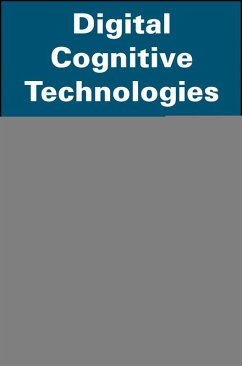Digital Cognitive Technologies (eBook, PDF)
Epistemology and Knowledge Society
Redaktion: Brossard, Claire; Reber, Bernard
181,99 €
181,99 €
inkl. MwSt.
Sofort per Download lieferbar

0 °P sammeln
181,99 €
Als Download kaufen

181,99 €
inkl. MwSt.
Sofort per Download lieferbar

0 °P sammeln
Jetzt verschenken
Alle Infos zum eBook verschenken
181,99 €
inkl. MwSt.
Sofort per Download lieferbar
Alle Infos zum eBook verschenken

0 °P sammeln
Digital Cognitive Technologies (eBook, PDF)
Epistemology and Knowledge Society
Redaktion: Brossard, Claire; Reber, Bernard
- Format: PDF
- Merkliste
- Auf die Merkliste
- Bewerten Bewerten
- Teilen
- Produkt teilen
- Produkterinnerung
- Produkterinnerung

Bitte loggen Sie sich zunächst in Ihr Kundenkonto ein oder registrieren Sie sich bei
bücher.de, um das eBook-Abo tolino select nutzen zu können.
Hier können Sie sich einloggen
Hier können Sie sich einloggen
Sie sind bereits eingeloggt. Klicken Sie auf 2. tolino select Abo, um fortzufahren.

Bitte loggen Sie sich zunächst in Ihr Kundenkonto ein oder registrieren Sie sich bei bücher.de, um das eBook-Abo tolino select nutzen zu können.
Digital Cognitive Technologies is an interdisciplinary book which assesses the socio-technical foundations of Information and Communication Technologies (ICTs), which are at the core of the "Knowledge Society." This book addresses eight major issues, analyzed by authors writing from a Human and Social Science and a Science and Technology perspective. The contributions seek to explore whether and how ICTs are changing our perception of time, space, social structures and networks, document writing and dissemination, sense-making and interpretation, cooperation, politics, and the dynamics of collective activity (socio-informatics).…mehr
- Geräte: PC
- ohne Kopierschutz
- eBook Hilfe
Andere Kunden interessierten sich auch für
![Digital Cognitive Technologies (eBook, ePUB) Digital Cognitive Technologies (eBook, ePUB)]() Digital Cognitive Technologies (eBook, ePUB)181,99 €
Digital Cognitive Technologies (eBook, ePUB)181,99 €![Trust Theory (eBook, PDF) Trust Theory (eBook, PDF)]() Christiano CastelfranchiTrust Theory (eBook, PDF)97,99 €
Christiano CastelfranchiTrust Theory (eBook, PDF)97,99 €![Digital Communications 2 (eBook, PDF) Digital Communications 2 (eBook, PDF)]() Safwan El AssadDigital Communications 2 (eBook, PDF)139,99 €
Safwan El AssadDigital Communications 2 (eBook, PDF)139,99 €![Speech Coding Algorithms (eBook, PDF) Speech Coding Algorithms (eBook, PDF)]() Wai C. ChuSpeech Coding Algorithms (eBook, PDF)184,99 €
Wai C. ChuSpeech Coding Algorithms (eBook, PDF)184,99 €![Emerging Wireless Multimedia (eBook, PDF) Emerging Wireless Multimedia (eBook, PDF)]() Emerging Wireless Multimedia (eBook, PDF)121,99 €
Emerging Wireless Multimedia (eBook, PDF)121,99 €![Digital Mobile Communications and the TETRA System (eBook, PDF) Digital Mobile Communications and the TETRA System (eBook, PDF)]() John DunlopDigital Mobile Communications and the TETRA System (eBook, PDF)166,99 €
John DunlopDigital Mobile Communications and the TETRA System (eBook, PDF)166,99 €![Cognitive Radio Communication and Networking (eBook, PDF) Cognitive Radio Communication and Networking (eBook, PDF)]() Robert Caiming QiuCognitive Radio Communication and Networking (eBook, PDF)95,99 €
Robert Caiming QiuCognitive Radio Communication and Networking (eBook, PDF)95,99 €-
-
-
Digital Cognitive Technologies is an interdisciplinary book which assesses the socio-technical foundations of Information and Communication Technologies (ICTs), which are at the core of the "Knowledge Society." This book addresses eight major issues, analyzed by authors writing from a Human and Social Science and a Science and Technology perspective. The contributions seek to explore whether and how ICTs are changing our perception of time, space, social structures and networks, document writing and dissemination, sense-making and interpretation, cooperation, politics, and the dynamics of collective activity (socio-informatics).
Dieser Download kann aus rechtlichen Gründen nur mit Rechnungsadresse in D ausgeliefert werden.
Produktdetails
- Produktdetails
- Verlag: John Wiley & Sons
- Erscheinungstermin: 9. Januar 2013
- Englisch
- ISBN-13: 9780470394236
- Artikelnr.: 37291898
- Verlag: John Wiley & Sons
- Erscheinungstermin: 9. Januar 2013
- Englisch
- ISBN-13: 9780470394236
- Artikelnr.: 37291898
- Herstellerkennzeichnung Die Herstellerinformationen sind derzeit nicht verfügbar.
Claire Brossard is the author of Digital Cognitive Technologies: Epistemology and Knowledge Society, published by Wiley. Bernard Reber is a philosopher and doctor in political research at Ecole des hautes études en sciences sociales in Paris, France, a CNRS research director and a member of the Centre de recherches politiques de Sciences Po (Cevipof).
Foreword xv
Dominique BOULLIER
Introduction xxi
Claire BROSSAUD and Bernard REBER
PART I. CAN ICT TELL HISTORY? 1
Chapter 1. Elements for a Digital Historiography 3
Andrea IACOVELLA
Chapter 2. "In Search of Real Time" or Man Facing the Desire and Duty of
Speed 23
Luc BONNEVILLE and Sylvie GROSJEAN
Chapter 3. Narrativity Against Temporality: a Computational Model for Story
Processing 37
Eddie SOULIER
PART II. HOW CAN WE LOCATE OURSELVES WITHIN ICT? 57
Chapter 4. Are Virtual Maps used for Orientation? 59
Alain MILON
Chapter 5. Geography of the Information Society 71
Henry BAKIS and Philippe VIDAL
Chapter 6. Mapping Public Web Space with the Issuecrawler 89
Richard ROGERS
PART III. ICT: A WORLD OF NETWORKS? 101
Chapter 7. Metrology of Internet Networks 103
Nicolas LARRIEU and Philippe OWEZARSKI
Chapter 8. Online Social Networks: A Research Object for Computer Science
and Social Sciences 119
Dominique CARDON and Christophe PRIEUR
Chapter 9. Analysis of Heterogenous Networks: the ReseauLu Project 137
Alberto CAMBROSIO, Pascal COTTEREAU, Stefan POPOWYCZ, Andrei MOGOUTOV and
Tania VICHNEVSKAIA
PART IV. COMPUTERIZED PROCESSING OF SPEECHES AND HYPERDOCUMENTS: WHAT ARE
THE METHODOLOGICAL CONSEQUENCES? 153
Chapter 10. Hypertext, an Intellectual Technology in the Era of Complexity
155
Jean CLÉMENT
Chapter 11. A Brief History of Software Resources for Qualitative Analysis
169
Christophe LEJEUNE
Chapter 12. Sea Peoples, Island Folk: Hypertext and Societies without
Writing 187
Pierre MARANDA
PART V. HOW DO ICT SUPPORT PLURALISM OF INTERPRETATIONS? 203
Chapter 13. Semantic Web and Ontologies 205
Philippe LAUBLET
Chapter 14. Interrelations between Types of Analysis and Types of
Interpretation 219
Karl M. VAN METER
Chapter 15. Pluralism and Plurality of Interpretations 231
François DAOUST and Jules DUCHASTEL
PART VI. DISTANCE COOPERATION 245
Chapter 16. A Communicational and Documentary Theory of ICT 247
Manuel ZACKLAD
Chapter 17. Knowledge Distributed by ICT: How do Communication Networks
Modify Epistemic Networks? 265
Bernard CONEIN
Chapter 18. Towards New Links between HSS and Computer Science: the CoolDev
Project 283
Grégory BOURGUIN and Arnaud LEWANDOWSKI
PART VII. TOWARDS RENEWED POLITICAL LIFE AND CITIZENSHIP 299
Chapter 19. Electronic Voting and Computer Security 301
Stéphan BRUNESSAUX
Chapter 20. Politicization of Socio-technical Spaces of Collective
Cognition: the Practice of Public Wikis 317
Serge PROULX and Anne GOLDENBERG
Chapter 21. Liaising using a Multi-agent System 331
Maxime MORGE
PART VIII. IS "SOCIO-INFORMATICS" POSSIBLE? 343
Chapter 22. The Interdisciplinary Dialog of Social Informatics 345
William TURNER
Chapter 23. Limitations of Computerization of Sciences of Man and Society
357
Thierry FOUCART
Chapter 24. The Internet in the Process of Data Collection and
Dissemination 373
Gaël GUEGUEN and Saïd YAMI
Conclusion 389
Bernard REBER and Claire BROSSAUD
Postscript 397
Roberto BUSA
List of Authors 401
Index 405
Dominique BOULLIER
Introduction xxi
Claire BROSSAUD and Bernard REBER
PART I. CAN ICT TELL HISTORY? 1
Chapter 1. Elements for a Digital Historiography 3
Andrea IACOVELLA
Chapter 2. "In Search of Real Time" or Man Facing the Desire and Duty of
Speed 23
Luc BONNEVILLE and Sylvie GROSJEAN
Chapter 3. Narrativity Against Temporality: a Computational Model for Story
Processing 37
Eddie SOULIER
PART II. HOW CAN WE LOCATE OURSELVES WITHIN ICT? 57
Chapter 4. Are Virtual Maps used for Orientation? 59
Alain MILON
Chapter 5. Geography of the Information Society 71
Henry BAKIS and Philippe VIDAL
Chapter 6. Mapping Public Web Space with the Issuecrawler 89
Richard ROGERS
PART III. ICT: A WORLD OF NETWORKS? 101
Chapter 7. Metrology of Internet Networks 103
Nicolas LARRIEU and Philippe OWEZARSKI
Chapter 8. Online Social Networks: A Research Object for Computer Science
and Social Sciences 119
Dominique CARDON and Christophe PRIEUR
Chapter 9. Analysis of Heterogenous Networks: the ReseauLu Project 137
Alberto CAMBROSIO, Pascal COTTEREAU, Stefan POPOWYCZ, Andrei MOGOUTOV and
Tania VICHNEVSKAIA
PART IV. COMPUTERIZED PROCESSING OF SPEECHES AND HYPERDOCUMENTS: WHAT ARE
THE METHODOLOGICAL CONSEQUENCES? 153
Chapter 10. Hypertext, an Intellectual Technology in the Era of Complexity
155
Jean CLÉMENT
Chapter 11. A Brief History of Software Resources for Qualitative Analysis
169
Christophe LEJEUNE
Chapter 12. Sea Peoples, Island Folk: Hypertext and Societies without
Writing 187
Pierre MARANDA
PART V. HOW DO ICT SUPPORT PLURALISM OF INTERPRETATIONS? 203
Chapter 13. Semantic Web and Ontologies 205
Philippe LAUBLET
Chapter 14. Interrelations between Types of Analysis and Types of
Interpretation 219
Karl M. VAN METER
Chapter 15. Pluralism and Plurality of Interpretations 231
François DAOUST and Jules DUCHASTEL
PART VI. DISTANCE COOPERATION 245
Chapter 16. A Communicational and Documentary Theory of ICT 247
Manuel ZACKLAD
Chapter 17. Knowledge Distributed by ICT: How do Communication Networks
Modify Epistemic Networks? 265
Bernard CONEIN
Chapter 18. Towards New Links between HSS and Computer Science: the CoolDev
Project 283
Grégory BOURGUIN and Arnaud LEWANDOWSKI
PART VII. TOWARDS RENEWED POLITICAL LIFE AND CITIZENSHIP 299
Chapter 19. Electronic Voting and Computer Security 301
Stéphan BRUNESSAUX
Chapter 20. Politicization of Socio-technical Spaces of Collective
Cognition: the Practice of Public Wikis 317
Serge PROULX and Anne GOLDENBERG
Chapter 21. Liaising using a Multi-agent System 331
Maxime MORGE
PART VIII. IS "SOCIO-INFORMATICS" POSSIBLE? 343
Chapter 22. The Interdisciplinary Dialog of Social Informatics 345
William TURNER
Chapter 23. Limitations of Computerization of Sciences of Man and Society
357
Thierry FOUCART
Chapter 24. The Internet in the Process of Data Collection and
Dissemination 373
Gaël GUEGUEN and Saïd YAMI
Conclusion 389
Bernard REBER and Claire BROSSAUD
Postscript 397
Roberto BUSA
List of Authors 401
Index 405
Foreword xv
Dominique BOULLIER
Introduction xxi
Claire BROSSAUD and Bernard REBER
PART I. CAN ICT TELL HISTORY? 1
Chapter 1. Elements for a Digital Historiography 3
Andrea IACOVELLA
Chapter 2. "In Search of Real Time" or Man Facing the Desire and Duty of
Speed 23
Luc BONNEVILLE and Sylvie GROSJEAN
Chapter 3. Narrativity Against Temporality: a Computational Model for Story
Processing 37
Eddie SOULIER
PART II. HOW CAN WE LOCATE OURSELVES WITHIN ICT? 57
Chapter 4. Are Virtual Maps used for Orientation? 59
Alain MILON
Chapter 5. Geography of the Information Society 71
Henry BAKIS and Philippe VIDAL
Chapter 6. Mapping Public Web Space with the Issuecrawler 89
Richard ROGERS
PART III. ICT: A WORLD OF NETWORKS? 101
Chapter 7. Metrology of Internet Networks 103
Nicolas LARRIEU and Philippe OWEZARSKI
Chapter 8. Online Social Networks: A Research Object for Computer Science
and Social Sciences 119
Dominique CARDON and Christophe PRIEUR
Chapter 9. Analysis of Heterogenous Networks: the ReseauLu Project 137
Alberto CAMBROSIO, Pascal COTTEREAU, Stefan POPOWYCZ, Andrei MOGOUTOV and
Tania VICHNEVSKAIA
PART IV. COMPUTERIZED PROCESSING OF SPEECHES AND HYPERDOCUMENTS: WHAT ARE
THE METHODOLOGICAL CONSEQUENCES? 153
Chapter 10. Hypertext, an Intellectual Technology in the Era of Complexity
155
Jean CLÉMENT
Chapter 11. A Brief History of Software Resources for Qualitative Analysis
169
Christophe LEJEUNE
Chapter 12. Sea Peoples, Island Folk: Hypertext and Societies without
Writing 187
Pierre MARANDA
PART V. HOW DO ICT SUPPORT PLURALISM OF INTERPRETATIONS? 203
Chapter 13. Semantic Web and Ontologies 205
Philippe LAUBLET
Chapter 14. Interrelations between Types of Analysis and Types of
Interpretation 219
Karl M. VAN METER
Chapter 15. Pluralism and Plurality of Interpretations 231
François DAOUST and Jules DUCHASTEL
PART VI. DISTANCE COOPERATION 245
Chapter 16. A Communicational and Documentary Theory of ICT 247
Manuel ZACKLAD
Chapter 17. Knowledge Distributed by ICT: How do Communication Networks
Modify Epistemic Networks? 265
Bernard CONEIN
Chapter 18. Towards New Links between HSS and Computer Science: the CoolDev
Project 283
Grégory BOURGUIN and Arnaud LEWANDOWSKI
PART VII. TOWARDS RENEWED POLITICAL LIFE AND CITIZENSHIP 299
Chapter 19. Electronic Voting and Computer Security 301
Stéphan BRUNESSAUX
Chapter 20. Politicization of Socio-technical Spaces of Collective
Cognition: the Practice of Public Wikis 317
Serge PROULX and Anne GOLDENBERG
Chapter 21. Liaising using a Multi-agent System 331
Maxime MORGE
PART VIII. IS "SOCIO-INFORMATICS" POSSIBLE? 343
Chapter 22. The Interdisciplinary Dialog of Social Informatics 345
William TURNER
Chapter 23. Limitations of Computerization of Sciences of Man and Society
357
Thierry FOUCART
Chapter 24. The Internet in the Process of Data Collection and
Dissemination 373
Gaël GUEGUEN and Saïd YAMI
Conclusion 389
Bernard REBER and Claire BROSSAUD
Postscript 397
Roberto BUSA
List of Authors 401
Index 405
Dominique BOULLIER
Introduction xxi
Claire BROSSAUD and Bernard REBER
PART I. CAN ICT TELL HISTORY? 1
Chapter 1. Elements for a Digital Historiography 3
Andrea IACOVELLA
Chapter 2. "In Search of Real Time" or Man Facing the Desire and Duty of
Speed 23
Luc BONNEVILLE and Sylvie GROSJEAN
Chapter 3. Narrativity Against Temporality: a Computational Model for Story
Processing 37
Eddie SOULIER
PART II. HOW CAN WE LOCATE OURSELVES WITHIN ICT? 57
Chapter 4. Are Virtual Maps used for Orientation? 59
Alain MILON
Chapter 5. Geography of the Information Society 71
Henry BAKIS and Philippe VIDAL
Chapter 6. Mapping Public Web Space with the Issuecrawler 89
Richard ROGERS
PART III. ICT: A WORLD OF NETWORKS? 101
Chapter 7. Metrology of Internet Networks 103
Nicolas LARRIEU and Philippe OWEZARSKI
Chapter 8. Online Social Networks: A Research Object for Computer Science
and Social Sciences 119
Dominique CARDON and Christophe PRIEUR
Chapter 9. Analysis of Heterogenous Networks: the ReseauLu Project 137
Alberto CAMBROSIO, Pascal COTTEREAU, Stefan POPOWYCZ, Andrei MOGOUTOV and
Tania VICHNEVSKAIA
PART IV. COMPUTERIZED PROCESSING OF SPEECHES AND HYPERDOCUMENTS: WHAT ARE
THE METHODOLOGICAL CONSEQUENCES? 153
Chapter 10. Hypertext, an Intellectual Technology in the Era of Complexity
155
Jean CLÉMENT
Chapter 11. A Brief History of Software Resources for Qualitative Analysis
169
Christophe LEJEUNE
Chapter 12. Sea Peoples, Island Folk: Hypertext and Societies without
Writing 187
Pierre MARANDA
PART V. HOW DO ICT SUPPORT PLURALISM OF INTERPRETATIONS? 203
Chapter 13. Semantic Web and Ontologies 205
Philippe LAUBLET
Chapter 14. Interrelations between Types of Analysis and Types of
Interpretation 219
Karl M. VAN METER
Chapter 15. Pluralism and Plurality of Interpretations 231
François DAOUST and Jules DUCHASTEL
PART VI. DISTANCE COOPERATION 245
Chapter 16. A Communicational and Documentary Theory of ICT 247
Manuel ZACKLAD
Chapter 17. Knowledge Distributed by ICT: How do Communication Networks
Modify Epistemic Networks? 265
Bernard CONEIN
Chapter 18. Towards New Links between HSS and Computer Science: the CoolDev
Project 283
Grégory BOURGUIN and Arnaud LEWANDOWSKI
PART VII. TOWARDS RENEWED POLITICAL LIFE AND CITIZENSHIP 299
Chapter 19. Electronic Voting and Computer Security 301
Stéphan BRUNESSAUX
Chapter 20. Politicization of Socio-technical Spaces of Collective
Cognition: the Practice of Public Wikis 317
Serge PROULX and Anne GOLDENBERG
Chapter 21. Liaising using a Multi-agent System 331
Maxime MORGE
PART VIII. IS "SOCIO-INFORMATICS" POSSIBLE? 343
Chapter 22. The Interdisciplinary Dialog of Social Informatics 345
William TURNER
Chapter 23. Limitations of Computerization of Sciences of Man and Society
357
Thierry FOUCART
Chapter 24. The Internet in the Process of Data Collection and
Dissemination 373
Gaël GUEGUEN and Saïd YAMI
Conclusion 389
Bernard REBER and Claire BROSSAUD
Postscript 397
Roberto BUSA
List of Authors 401
Index 405







